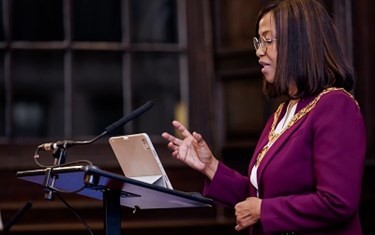 I’m just back from attending World Urban Forum 12 ( WUF12) in Cairo, representing both the RTPI as President and as Chair of the Global Planners Network. It was stimulating, thought provoking and further reinforced to me the role that planning has in tackling the challenges of rapid urbanisation and the global housing crisis.
I’m just back from attending World Urban Forum 12 ( WUF12) in Cairo, representing both the RTPI as President and as Chair of the Global Planners Network. It was stimulating, thought provoking and further reinforced to me the role that planning has in tackling the challenges of rapid urbanisation and the global housing crisis.
The WUF is convened biennially by UN Habitat and this year Cairo provided a compelling case study where I saw the ancient heritage of Cairo alongside rapid urbanisation. WUF12 was held at the Egypt International Exhibition Centre in New Cairo. New Cairo being a modern planned city located on the outskirts of Cairo and intended as an extension of the increasingly congested capital which currently has a staggering population of over 22 million people.
New Cairo was initiated in the early 2000s and is part of a larger government effort to reduce pressure on Cairo’s infrastructure from an increasing population. It’s a mix of gated communities and residential complexes, high end shopping malls and a number of global education institutions and businesses. And there lies a quandary, because New Cairo could be seen as contributing to a growing socioeconomic divide within the city unless resources are invested across the entire city (old and new), creating affordable decent homes, job opportunities and infrastructure where it is needed.
Arguably, this year’s theme ‘It all starts at Home’ picks up this issue, with an emphasis on local action and the pivotal role of local governments in shaping cities and human settlements. With half of the worlds population residing in urban areas, there is a real challenge and an acknowledged global housing crisis.
Six main dialogues set the agenda for the 5 days; Housing our Future, Cities and Climate Crisis, Stronger Together, Financing Localisation and Localising Finance, Putting People first in a Digital Era and the Loss of Home. These dialogues were curated by the UN Habitat through round tables, assemblies, panel discussions and partner led events with practitioners, academics, built environment, sustainability experts and many institutions providing examples of case studies to highlight challenges, positive outcomes and good practice, with a view to share learning and engagement in wider debates.
So why attend? Because as planners we know that planning is central to achieving a number of the 17 SDGs, and in particular SDG 11, sustainable cities and communities. Over 24000 participants attended this year from over 182 countries, and there was much to learn, and contribute to, on the latest innovations, policies, practices, technologies and education in urban development and from a truly global perspective.
I made my own contributions, attending the Habitat Professionals roundtable in my capacity as GPN Chair, and as RTPI President sitting on three panels covering Academia and the New Urban Agenda, scaling up Affordable and Sustainable Housing and SDGs in Action, and undertaking a joint press conference on the launch of the Charter for Participatory Planning which promotes the right to take part in decision making and shaping urban environments and territories, building consensus and co-creating solutions to address common challenges.
Ahead of World Town Planning Day, the RTPI hosted an evening reception on behalf of the Global Planners Network. This was one of the highlights of the week with so many different organisations in attendance, including Commonwealth Association of Planners, International Society of City and Regional Planners, South African Council for Planners, American Planning Association, Kenya Institute of Planners, Bangladesh Institute of Planners, Malaysian Institute of Planners, Uganda Institute of planners, European Council of Spatial planners, and academics from one of RTPI accredited planning schools (Bartlett). Those couple of hours felt like a real sense of belonging in a community with shared purpose and a shared agenda.
And so to the Cairo Call to Action. On the final day, delegations adopted the Cairo Call to Action, pledging to act with urgency to address the global housing crisis as well as leveraging local action to achieving global goals and targets. The Cairo Call to Action also emphasised, among other points, the need for sustaining a systemic representation of local actors at all levels, sharing urban spaces and opportunities inclusively, urban planning to deliver better local outcomes, and unlocking finance for cities and communities.
Delegations also committed to ensuring equity and justice for sustainable cities, leveraging local and grassroots data for decision-making, harnessing culture and heritage as an asset for sustainability, and building coalitions and alliances to scale local impact.
There is a lot in the Call to Action, and we know what we need to do!


